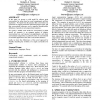66 search results - page 6 / 14 » A Formal Model of Emotion-Based Action Tendency for Intellig... |
AAAI
2007
13 years 9 months ago
2007
We describe how a physical robot can learn about objects from its own autonomous experience in the continuous world. The robot identifies statistical regularities that allow it t...
FAABS
2000
Springer
13 years 11 months ago
2000
Springer
This paper integrates research in robot programming and reasoning about action with research in model-based reasoning about physical systems to provide a capability for modeling an...
ECAI
1994
Springer
13 years 11 months ago
1994
Springer
Formal analyses of social action for Distributed A.I. (DAI) have focussed, almost exclusively, on scenarios in which participating agents have a joint intention to act. While such ...
AOSE
2001
Springer
13 years 12 months ago
2001
Springer
In this paper, we present a social model for software agent conversations for action based on social commitments and their negotiation. We depart from the premises that conversati...
KI
2006
Springer
13 years 7 months ago
2006
Springer
Abstract. Several options are available to relate agent logics to computational agent systems. Among others, one can try to find useful executable fragments of an agent logic or us...

